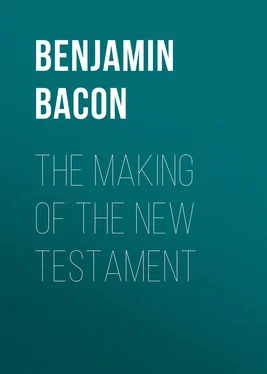Benjamin Bacon - The Making of the New Testament
Здесь есть возможность читать онлайн «Benjamin Bacon - The Making of the New Testament» — ознакомительный отрывок электронной книги совершенно бесплатно, а после прочтения отрывка купить полную версию. В некоторых случаях можно слушать аудио, скачать через торрент в формате fb2 и присутствует краткое содержание. ISBN: , Жанр: foreign_antique, foreign_prose, на английском языке. Описание произведения, (предисловие) а так же отзывы посетителей доступны на портале библиотеки ЛибКат.
- Название:The Making of the New Testament
- Автор:
- Жанр:
- Год:неизвестен
- ISBN:http://www.gutenberg.org/ebooks/39288
- Рейтинг книги:5 / 5. Голосов: 1
-
Избранное:Добавить в избранное
- Отзывы:
-
Ваша оценка:
- 100
- 1
- 2
- 3
- 4
- 5
The Making of the New Testament: краткое содержание, описание и аннотация
Предлагаем к чтению аннотацию, описание, краткое содержание или предисловие (зависит от того, что написал сам автор книги «The Making of the New Testament»). Если вы не нашли необходимую информацию о книге — напишите в комментариях, мы постараемся отыскать её.
The Making of the New Testament — читать онлайн ознакомительный отрывок
Ниже представлен текст книги, разбитый по страницам. Система сохранения места последней прочитанной страницы, позволяет с удобством читать онлайн бесплатно книгу «The Making of the New Testament», без необходимости каждый раз заново искать на чём Вы остановились. Поставьте закладку, и сможете в любой момент перейти на страницу, на которой закончили чтение.
Интервал:
Закладка:
Two generations of research and controversy have greatly advanced the cause of constructive criticism. Hand in hand with a more accurate dating of the literature, secured through more impartial judgment of both the external and internal evidence, there has gone a reconstruction of our conception of the course of events. The tendencies in the early church were not two only, but four; corresponding, perhaps, to those rebuked by Paul at Corinth, which called themselves by the names respectively of Peter, of Paul, of Apollos and of Christ. It seems probable from the bitterness with which in 2nd Cor. x. 7 Paul denounces the man who says, "I am of Christ," that this party-cry was employed in the sense of following the example of Jesus as respects obedience to the Law (for even Paul acknowledged that Christ had been "made a minister of the circumcision for the truth of God"). If so, the Corinthian "Christ-party" may be identified with those "ministers of the circumcision" who denied both the apostleship and the gospel of Paul. At all events those "of Cephas" were relatively harmless. They may be identified with the so-called 'weak' of Romans, for whose scruples on the score of 'pollutions of idols' Paul demands such consideration both at Corinth and at Rome. His own adherents both at Corinth (those 'of Paul') and at Rome (the 'strong') are to follow his example not merely in recognizing that: "No idol is anything in the world," that "there is nothing unclean of itself," and that "all things are lawful." It is to be followed also in recognizing the limitations of this liberty. Limits are imposed among other things by the scruples of others, so that Paul himself becomes "as under the Law" when among Jews, though "as without the Law" among the Gentiles. The "weak" are to be resisted only when the admission of themselves or their claims would lead to "doubtful disputations," or to a rebuilding of walls of separation that had been torn down through faith in Christ. Galatians sounds the battle-cry of endangered liberty. Corinthians (and Romans in still higher degree) shows the magnanimity of the victor.
Whether it be possible to identify those "of Apollos" at Corinth with the beginnings of that Hellenistic perversion of the Pauline gospel into a mystical theosophy which afterwards passed into Gnosticism may be left an open question. At least we have come to see that the conditions of the church's growth were far more complex than Baur imagined. In particular it is necessary to distinguish four different attitudes on the single question of the obligation of the Law. There were (1) Judaizers who insisted on complete submission to the Law as the condition of salvation, for both Jews and Gentiles; (2) imitators of Cephas, who considered believers of Jewish birth to be "under the Law," but asked of Gentiles only such consideration for it as the special conditions seemed to require; (3) Paulinists, who held that neither Jews nor Gentiles are under the law, yet felt that consideration should be shown for the scrupulous when asked not as of right, but as of charity; (4) radicals, who recognized no limits to their freedom save the one new commandment.
But while conflict first broke out over the mere concrete question of Gentile liberty, the real distinction of Paul's gospel from that of the older apostles was far deeper. The question as Tübingen critics conceived it concerned primarily the extent of the gospel message, – to how large a circle was it offered? Modern criticism has come to see that the difference was in higher degree a difference of quality . Paul's whole message of redemption through the cross and resurrection started from other premises than those of the Galilean apostles, and was conceived in other terms. For this reason it leads over to a new Christology. In short, the transition of Christianity from its Jewish to its Gentile form is not a mere enlargement of its field by the abolition of particularistic barriers. The background we must study for the understanding of it is not so much mere contemporary history as the contemporary history of religion . The development from the Petrine gospel broadly characteristic of the Synoptic writings, through the Pauline Epistles to that of the Johannine writings, is a transition from Hebrew to Hellenistic conceptions of what redemption is, and how it is effected. Modern criticism expresses the contrast in its distinction of the gospel of Jesus from the gospel about Jesus.
In the case of both Paul and his predecessors in the faith there is a common starting-point. It was the doctrine that God had raised Jesus from the dead and exalted Him as Christ and Lord to the throne of glory. Its proofs were the ecstatic phenomena of the Spirit, those strange manifestations of 'prophecy,' 'tongues,' and the like in the Christian assembly. The inference from this resurrection faith for an apostle of the Galilean group was that he must "teach all men everywhere to observe all things whatsoever Jesus had commanded." Jesus had been raised up in Israel as the Prophet like unto Moses; His apostle must repeat the remembered word of commandment and the word of promise. He will have an authority derived from the manifestations of signs and wonders. These had accompanied Jesus' own career, and now, by grace of His endowment of His disciples with the Spirit, they will be repeated by their hands. The 'apostolic' gospel is thus primarily historical. The Pauline gospel centres at the other pole of religious conviction. It is primarily psychological. For Paul the immediate effect of the revelation of God's Son "in" him is an irresistible impulse to relate his own soul's experience. The gospel he preaches is not so much what Jesus did or said while on earth, as what God has done, and is still doing, through the "life-giving Spirit" which emanates from the risen Lord. Signs and wonders are tokens of the Spirit, but are of less value, and must vanish before the "abiding" ethical gifts. Both the Pauline and the Petrine gospel start from the common confession of "Jesus as Lord"; but the Christology of the Synoptic literature is an Apotheosis doctrine, falling back on the historical Jesus. That of the Epistles is a doctrine of Incarnation, appealing to the eternal manifestation of God in man. For the former, Jesus was "a prophet mighty in deed and word," raised up by God in accordance with the promise of Deut. xviii. 18, to turn Israel to repentance. Having fulfilled this mission in rejection and martyrdom Jesus had been exalted to God's "right hand" and "made both Lord and Christ." He there awaits the subjection of all His enemies. In the Pauline gospel the story of Jesus is a drama of the supernal regions, wherein His earthly career as prophet, leader, teacher, sinks to the level of the merest episode. As pre-existent spirit, Jesus had been from the beginning of the creation "in the form of God." As the period of its consummation drew near He took upon Him human form, descended through suffering and death to the lowest depths of the underworld, and by divine power had reascended above all the heavens with their ranks of angelic hierarchies. Whether Paul himself so conceived it or not, the Gentile world had no other moulds of thought wherein to formulate such a Christology than the current myths of Redeemer-gods. The value of the individual soul had at last been discovered, and men resorted to the ancient personifications of the forces of nature as deliverers of this new-found soul from its weakness and mortality. The influential religions of the time were those of personal redemption by mystic union with a dying and resurrected "Saviour-god," an Osiris, an Adonis, an Attis, a Mithra. Religions of this type were everywhere displacing the old national faiths. The Gentile could not think of "the Christ" primarily as a Son of David who restores the kingdom to Israel, shatters the Gentiles like a potter's vessel and rules them with a rod of iron. If he employed this Old Testament language at all, it had for him a purely symbolical sense. The whole conception was spiritualized. The "enemies" overcome were the spiritual foes of humanity, sin and death; "redemption" was not the deliverance of Israel out of the hand of all their enemies, that (together with all afar off that call upon the name of this merciful God) they may "serve Him in holiness and righteousness all their days." It was the rescue of the sons of Adam out of the bondage to evil Powers incurred through inheritance of Adam's sinful flesh. This had been the tendency already of Jewish apocalypse. The starting-point of Paul's own conceptions was not Israel's bondage in Egypt, but a conception already tinged, like the late book of Jewish philosophy called the Wisdom of Solomon, with the Stoic conception of 'flesh' as prison-house of 'spirit,' already inflamed, like the contemporary Jewish apocalypses of Esdras and Baruch, with lurid visions of a universe rescued by superhuman power from a thraldom of demonic rule. Paul's preaching was made real by his own experience. For if ever there was an evangelist whose message was his own experience, Paul was such. And Paul's experience was not so much that of a Palestinian Jew, as that of a Hellenist, one whose whole idea of 'redemption' has been unconsciously universalized, individualized, and spiritualized, by contact with Greek and Hellenistic thought. Paul and the Galilean apostles were not far apart in their expectations of the future. Both stood gazing up into heaven. But for his authority Paul inevitably looked inwards, the Galilean apostles looked backwards.
Читать дальшеИнтервал:
Закладка:
Похожие книги на «The Making of the New Testament»
Представляем Вашему вниманию похожие книги на «The Making of the New Testament» списком для выбора. Мы отобрали схожую по названию и смыслу литературу в надежде предоставить читателям больше вариантов отыскать новые, интересные, ещё непрочитанные произведения.
Обсуждение, отзывы о книге «The Making of the New Testament» и просто собственные мнения читателей. Оставьте ваши комментарии, напишите, что Вы думаете о произведении, его смысле или главных героях. Укажите что конкретно понравилось, а что нет, и почему Вы так считаете.












